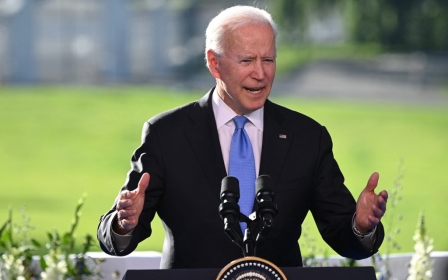Majority of Democrats say US 'not supportive enough of Palestinians'

Fifty-one percent of Democrat voters, including 62 percent who identify as liberal, say they want the United States to do more to support Palestinians, according to a new poll on American attitudes towards the Palestinian-Israeli conflict.
The poll, published on Wednesday by The Associated Press-NORC Center for Public Affairs Research, shows a growing rift on the issue of Palestinian rights among Democratic lawmakers is also reflected in the party's voter base.
Thiry-nine percent of Democrat respondents also said they thought the US was giving too much support to Israel.
The survey was conducted about three weeks into a ceasefire agreement following Israel's recent devastating 11-day offensive on the besieged Gaza Strip.
Israeli air strikes killed at least 254 Palestinians, including dozens of children, while rockets fired into Israel killed 13 people.
While the survey found a partisan split in voters' views, with liberals wanting more US support for Palestinians and conservatives wanting more US support for Israel, the overall majority, 56 percent, disapproved of the way in which President Joe Biden handled the situation.
"I started paying a lot more attention," Paul Spelce, a 26-year-old Democratic-leaning independent voter and supporter of Palestinian statehood, told the AP.
Spelce, who comes from a heavily religious Texas Republican family whose support for Israel he said was ingrained with their Christian faith, said he thought the US was too supportive of Israelis and not supportive enough of the Palestinians.
"I don't think Biden's word was that strong," Spelce said. "And I don’t think, you know, this administration… can actually do anything [regarding the conflict]."
Support for Palestinian state
Broad and bipartisan support for Israel has long been a tenet of American domestic politics, as well as its foreign policy. Biden himself refrained from publicly criticising Israel's actions in the Gaza Strip and waited until the last days of fighting last month to openly press Israel for a ceasefire.
The latest offensive on Gaza, however, highlighted differences between some Democratic lawmakers and Biden.
Dozens of Democrats in Congress called for Israel and Hamas to cease fire immediately, days before Biden openly did so. A group of 500 Democratic staffers, many of whom campaigned for Biden's election, called on the US administration to hold Israel accountable and take "concrete steps" to end Israel's occupation of Palestinian territories.
The offensive also sparked a number of large protests across many major cities in the US, including in New York City and Washington DC.
The poll also shows just 19 percent of Americans think Washington should play a major role in finding a solution to the conflict, while 50 percent say it should play a minor role and 28 percent say it should play no role. Democrat and Republican voters are largely in agreement on the size of the US role.
A majority of Americans, 57 percent, say they think there is a way for Israel and an independent Palestinian state to coexist peacefully, compared with 39 percent who say there is not. About two-thirds of Democrats and half of Republicans also agree there is a way for two such states to coexist.
A Gallup poll in March reported a majority of Democratic voters responding that the US should be putting more pressure on the Israeli government than the Palestinian leadership.
The AP-NORC poll surveyed 1,125 adults between 10 to 14 June, and the margin of sampling error for all respondents was plus or minus 4.2 percentage points.
Middle East Eye propose une couverture et une analyse indépendantes et incomparables du Moyen-Orient, de l’Afrique du Nord et d’autres régions du monde. Pour en savoir plus sur la reprise de ce contenu et les frais qui s’appliquent, veuillez remplir ce formulaire [en anglais]. Pour en savoir plus sur MEE, cliquez ici [en anglais].





